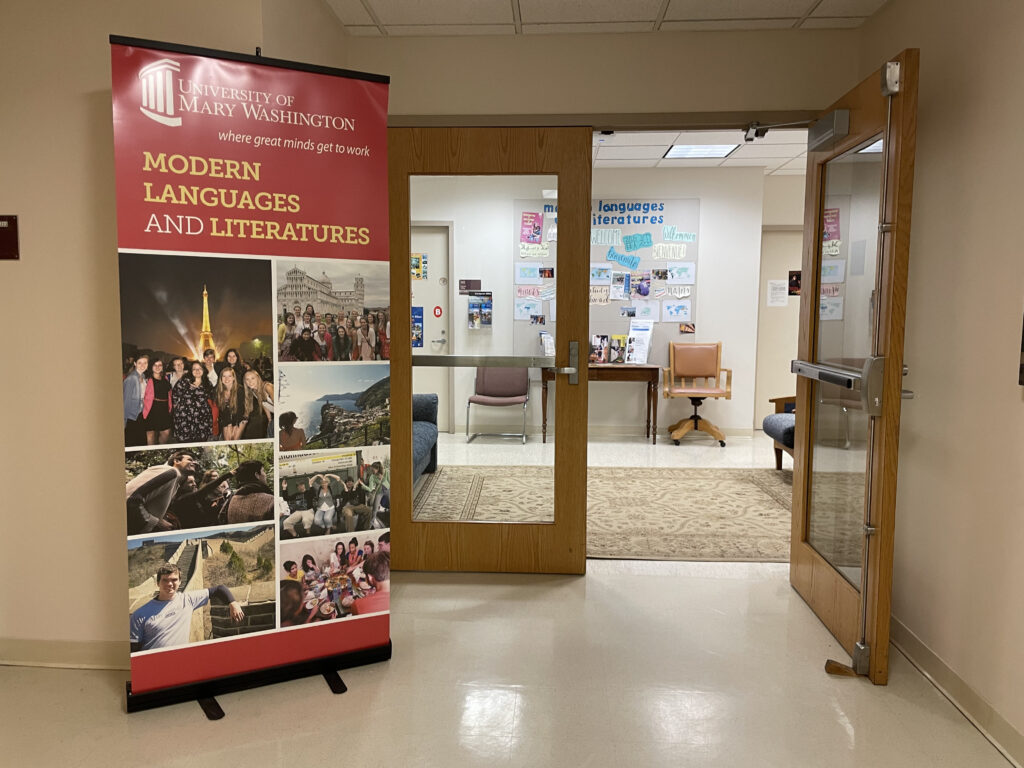Harvard Business Publishing Executive Ashley Voeks helps language students identify marketable skills
4 min read
Voeks discussed skills acquired in language classes that extend beyond the language itself. | Norah Walsh, The Weekly Ringer
by MANDY SOUZA
Staff Writer
On Feb. 1, the class “Life and Career After UMW: Careers with Languages” welcomed Executive of Harvard Business Publishing Ashley Voeks to discuss key ways to showcase and advertise language students’ skills for the job market. As the lecture was given over Zoom, it was open to the public.
During her lecture, Voeks spoke about the skills acquired in language classes that extend beyond the language itself.
“There are all kinds of other transferable or soft skills associated with the act of learning the language,” she said.
Voeks received a Ph.D. in French studies from the University of Texas at Austin in 2019 before becoming an assistant professor there. During her doctorate studies, she was able to focus on academic and non-academic job markets and adapted her knowledge and best practices to meet her students’ needs. Now, Voeks serves as a career coach, helping students to fill existing career-readiness gaps.
Voeks highlighted the importance of developing soft skills for students to make themselves more marketable to employers across all industries. She identified communication, empathy, humility, self-confidence, patience and time management as some of the most in-demand skills.
According to Voeks, confidence is key, and it can be acquired through practice.
“Some people just naturally have that confident demeanor about them, and they do have a leg up in a certain regard when they enter the job market; if they’re naturally competent, they can naturally make those connections and project confidence in whatever role they’re seeking,” she said. “But for those who don’t have that confident demeanor, it’s that much more important to practice, and it will come.”
Voeks also spoke about her role as a career coach and the elements of work preparedness that she finds significant. One of the top qualities she highlighted was student self-awareness through reflection.
“I really emphasize for [students] the importance of self-reflection, and when they’re thinking about skills in general—whether it’s communication, adaptability, collaboration, any of those skills—they have to be able to think about them in terms of their own experiences in the classroom; in their own experience with language learning,” she said.
To Voeks, students should be thinking about their personal skills narrative. She suggested that students reflect on which skills they have, how they can define them and how they can prove them or tie them to a certain experience. By creating this narrative, graduating students can speak not only about their studies but also about applicable experiences they learned during their college careers.
“One of the biggest mistakes that I see is students getting to the point where they believe that they’re ready to enter the job market because of timing; because they’re about to graduate,” she said. “And being ready to graduate is not an indicator of someone’s readiness to start applying for certain jobs that require experience.”
Voeks described the lessons that can be taught and the skills that students acquire through their language-learning journey. She explained that students will make mistakes along the way, but it’s only natural to stumble a little when learning a new language. With these challenges, students gain experiences that highlight their soft skills.
“They’re developing a sense of humility. They’re developing a sense of resiliency. And so, for them, the skills that they’re reflecting on can really be tied to their specific experience with language learning,” she said. “It’s not just a list of the skills that language students develop; it really depends on that personal experience with acquiring the language.”
Voeks shared that language learning also helps develop empathy, another valuable skill.
“Learning to read Italian literature, for example, has allowed me to gain a deeper understanding of world views of writers and readers from different time periods and backgrounds,” she said. “Empathy is important in a work environment because it leads to an appreciation of others, which can in turn increase productivity.”
Students studying languages commented on the lessons that they learned from Voeks as well as how her speech shaped their view of the future.
“I learned that language students in particular have a unique set of skills that can be applied to many different jobs, not just ones involving their language,” said Jessica Oberlies, a junior environmental science and Spanish double major. “Her insight was helpful in thinking about how the unique experiences we’ve had with language set us apart from other applicants and can be a big asset in our future careers.”
Sasha Poletes, a senior French and international affairs double major, noted how identifying the skills she has acquired as a French major has made her feel more secure as she prepares to graduate.
“As a graduating senior, learning how I can use the skills I’ve acquired as a language major in areas that seem unrelated at first glance made me feel a lot more secure about future job opportunities,” she said. “I’ve always struggled with making my experiences ‘marketable,’ but after hearing her presentation, I think I’ll be able to apply her advice to my resumé and come in for interviews a lot more prepared.”











